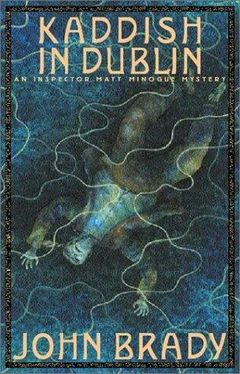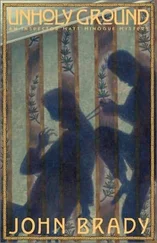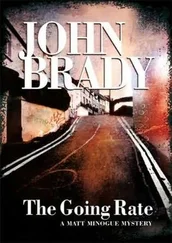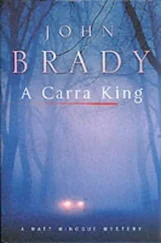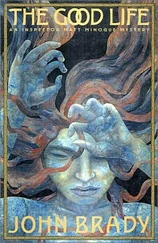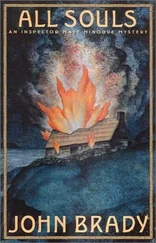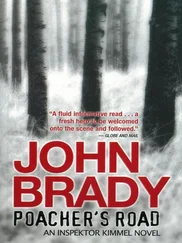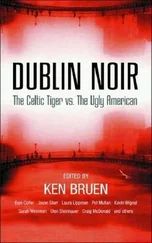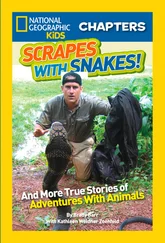John Brady - Kaddish in Dublin
Здесь есть возможность читать онлайн «John Brady - Kaddish in Dublin» весь текст электронной книги совершенно бесплатно (целиком полную версию без сокращений). В некоторых случаях можно слушать аудио, скачать через торрент в формате fb2 и присутствует краткое содержание. Жанр: Полицейский детектив, на английском языке. Описание произведения, (предисловие) а так же отзывы посетителей доступны на портале библиотеки ЛибКат.
- Название:Kaddish in Dublin
- Автор:
- Жанр:
- Год:неизвестен
- ISBN:нет данных
- Рейтинг книги:5 / 5. Голосов: 1
-
Избранное:Добавить в избранное
- Отзывы:
-
Ваша оценка:
- 100
- 1
- 2
- 3
- 4
- 5
Kaddish in Dublin: краткое содержание, описание и аннотация
Предлагаем к чтению аннотацию, описание, краткое содержание или предисловие (зависит от того, что написал сам автор книги «Kaddish in Dublin»). Если вы не нашли необходимую информацию о книге — напишите в комментариях, мы постараемся отыскать её.
Kaddish in Dublin — читать онлайн бесплатно полную книгу (весь текст) целиком
Ниже представлен текст книги, разбитый по страницам. Система сохранения места последней прочитанной страницы, позволяет с удобством читать онлайн бесплатно книгу «Kaddish in Dublin», без необходимости каждый раз заново искать на чём Вы остановились. Поставьте закладку, и сможете в любой момент перейти на страницу, на которой закончили чтение.
Интервал:
Закладка:
“Justice Fine,” Minogue shouted, and threaded his way around bog-holes toward the stationary figure.
“I thought it was yourself,” Minogue called out.
“We share the same bog, isn’t that something?” said Fine as he shook hands. His face was relaxed, suggesting wry amusement at the sight of Minogue. “What are you at?”
“I’m going home for my tea,” replied Minogue, pointing toward where he believed Kathleen and the Fiat were. “Here look, do you want a lift? That rain will be coming in in earnest, I’m thinking.”
Fine walked alongside Minogue. “I’m parked up above the village. The time ran away on me but I think I could have made it before the dark. I would have stepped out on to the road if it had turned dark on me.”
“I didn’t know you for a bog-man,” said Minogue.
Fine shrugged. “I came up from town to get a bit of space.” He stopped and surveyed the desolate landscape. “Plenty of room up here, and that’s a fact,” he murmured. He turned to Minogue with a quizzical expression and said: “ ‘Great hatred and little room… ’”
“ ‘… had maimed us from the start,’ ” Minogue finished.
Fine shook his head and looked down at his Wellington boots. “You’re a gas man, Minogue. Spouting Yeats and annoying people. I don’t think there’s a man in Dublin-outside of the Gardai, I mean-that’d believe a Guard is interested in poetry or museums.”
“Ah, why ruin a good stereotype,” Minogue said. “People depend on them, and sure it gives you a good cover to move around under.”
Fine began walking again. “ ‘Great hatred… little room,’ ” he said. “Room in the head and the heart departments, I suppose he was talking about.”
“I’d say so, all right,” Minogue agreed.
“Rosalie and I have been giving serious consideration to leaving,” said Fine then. Minogue was too taken aback to say anything. “It was her saying something that got me to thinking about that poem.”
Minogue said awkwardly, “You remember scraps of things, I suppose…”
“She has the feeling that there’s not room for us here any more. Odd sort of idea, and I’m not sure what she means.”
“If ye get up and leave, there’d be less room for the likes of us, I think,” said Minogue. Fine looked over to Minogue and frowned. Then his face relaxed.
“You are one of the oddest people I have ever met, Minogue-and I have lived and worked in a very odd city all my life. How did you ever get stuck into the job of being a Guard?”
Minogue shrugged.
“I don’t know. But the reasons I stay at it are different from the reasons I joined up. I was obliged to give up being an iijit a number of years ago… and I’m very glad of getting the chance, I can tell you.”
Fine smiled briefly and took up the pace again.
“Well, there’s a bit more to this place here than meets the eye,” said Fine as he looked around the bog. He stopped and wiped drizzle off his forehead, and pointed toward what Minogue guessed was Kippure Mountain, hidden in the cloud.
“I used to come up here for years. That was before they put the television mast up there and then the Army to guard it. You can’t be walking up there now because you’d be up for trespassing in a security zone. How would it look if I was up in court in front of myself one fine day, charged with trespass?”
“I’d hope you’d be lenient on yourself,” said Minogue. He felt the rain plaster his hair to his forehead.
“I still come up here the odd time,” Fine continued as he stared up into the clouds where Kippure was shrouded. “There’s something here for us Jews, you see. Did you know?”
“I didn’t.”
“The story has always affected me more than others I spoke to about it. That comes of being a poet in my spare time, you understand… An Irishman, a Dublinman, I believe, went to Spain some time in the seventeenth century and brought himself home a nice Spanish wife. They lived somewhere near Dublin, I can’t find out where. Every year the wife would go missing for a day or two, off on her own. During her lifetime nobody knew what she was at or where she went or why, but it went on year after year. She travelled alone, up into the mountains. Oddly enough, she was never harassed here, and you’d know from your history that the O’Tooles and the O’Byrnes didn’t care a damn for English rule in the country and did what they could until after the ‘98 Rebellion, pretty well… She came back safe and sound every year after the day’s absence. I suspect that her husband must have known what she was about.”
“The Wicklowmen are a tough crowd, this is true,” Minogue agreed.
The bog road where Kathleen was waiting for them was part of the Military Road which had been built with the aim of moving troops quickly and safely into the mountains of Wicklow to quell rebels and their families in the wake of the 1798 Rebellion.
“Anyway. This woman came up here every year. After she died, it was found out that she came up here to Kippure on the exact day when our Day of Atonement fell.”
He looked balefully at Minogue.
“Yom Kippur,” Minogue murmured. “Kippure.”
“Exactly.”
“I’m astounded. I never imagined…”
“Hardly anyone knows that,” Fine said, beginning his walk again.
“We don’t know her name but her life reminds us of Ruth and the whole history of the Diaspora. The woman was a Marrano: that’s the Spanish for ‘pig’. Do I need to remind you of the prohibition against pork? Marranos were those who survived the Inquisition only by renouncing their faith. The other alternative was to get burned at the stake.”
Burned, Minogue’s thoughts raced. Kelly in the car. For renouncing? Opus Dei had been founded in Spain and it had flourished under Franco. What did it mean? Was this what history was? Fine had spoken without irony when he uttered the word marrano. The facts were simple, the events past and unreachable. Why then did Minogue feel so stricken? Of course Billy Fine would be alive to the connection, this odd echo through time.
“Apparently people liked this woman very much, and they named the mountain after her,” said Fine quietly, picking his way around a turf-cut already filling with water.
“That was a terrible thing that she should have to…”
“Worse has happened,” said Fine simply. “And we’re still here. Let’s avoid this survivalist stuff. There’s more to Judaism than what some Austrian crackpot or the Spanish Inquisition tried to do.”
The two men were now in sight of the car. Minogue’s mind groped for the connection between Paul Fine and the woman who had come up here every year of her exile, centuries before. He wanted to go to Burke’s Residence and tell him that there could be no excuse, that people like Gibney would always follow because of the way the Church throttled Irish minds. But no: Burke and Heher and the rest of them would simply ask him for proof of causation… direct causes… necessary and sufficient cause. They’d tie Minogue up with sophistry.
“Who’s in the car?”
“Kathleen, my wife.”
Fine turned and took a look at where Kippure Mountain should be.
“Rosalie’s at home, packing. We’re off in the morning to London for a few days. We’ll stay with David and give him a rest from looking down people’s gobs to make a living. Then we’ll be off to Jerusalem.”
“For a while, is it?”
“A nice ambiguous question from a nice ambiguous Garda,” Fine smiled slowly. “We’ll stay a couple of weeks but then we’ll be back.”
Minogue nodded. “That’s great,” he said.
“I thought about it a lot. I don’t think I could keep quiet about the distaste I have for the way Israeli politics are going at the moment. It’s a very different country from what it was before. I don’t do very well with extremists: that may be a Dubliner’s trademark, that. As well as that, I think I might make an injudicious remark there a bit too often. Johnny Cohen says I’m not religious enough to ignore things, but I know he’s codding me. Then I was thinking about those Opus Dei people. There are extremists everywhere, aren’t there? It’s that simple.”
Читать дальшеИнтервал:
Закладка:
Похожие книги на «Kaddish in Dublin»
Представляем Вашему вниманию похожие книги на «Kaddish in Dublin» списком для выбора. Мы отобрали схожую по названию и смыслу литературу в надежде предоставить читателям больше вариантов отыскать новые, интересные, ещё непрочитанные произведения.
Обсуждение, отзывы о книге «Kaddish in Dublin» и просто собственные мнения читателей. Оставьте ваши комментарии, напишите, что Вы думаете о произведении, его смысле или главных героях. Укажите что конкретно понравилось, а что нет, и почему Вы так считаете.
